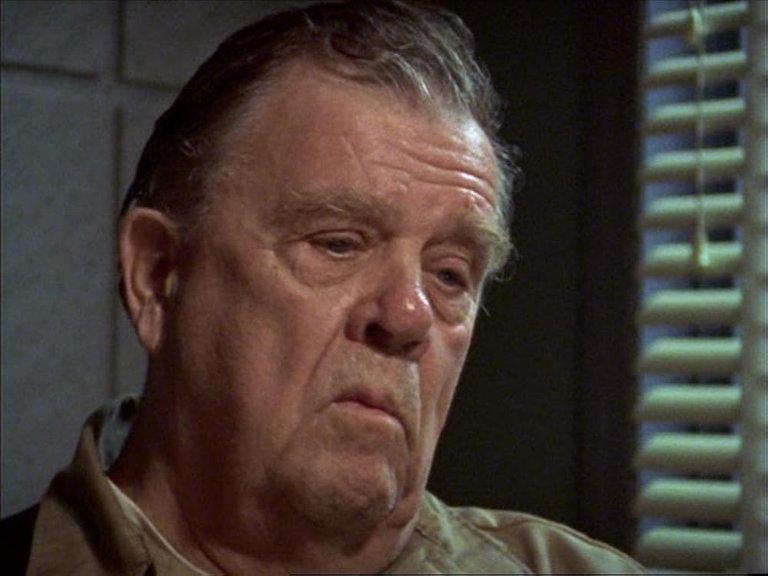Television Review: Red, Red Wine (Homicide: Life on the Street, S7X05, 1998)

Red, Red Wine (S07E05)
Airdate: 6 November 1998
Written by: Sara B. Cooper
Directed by: Ed Bianchi
Running Time: 44 minutes
Season 7 of Homicide: Life on the Street struggled to recapture the grit and nuance that defined its earlier seasons, even when attempting to address past missteps. One such instance is the episode Red, Red Wine, which revisits the theme of domestic terrorism—a subject mishandled in a prior season—but falters under the weight of melodrama and forced subplots. While the episode demonstrates growth in its portrayal of federal involvement in crises, its execution remains uneven, revealing the series’ declining confidence in balancing procedural rigor with human drama.
The episode directly contrasts For God and Country (Season 4), a crossover with Law & Order that depicted a mass terrorist attack in New York and Baltimore without acknowledging federal agencies’ involvement—a glaring oversight given the scale of the threat. Red, Red Wine rectifies this by introducing a plausible federal response to a suspected bioterrorism incident. However, the episode’s resolution is undermined by its reliance on clichés and strained character dynamics, suggesting that Season 7’s attempts to self-correct often faltered beneath its ambition.
The plot revolves around a series of mysterious deaths linked to a toxin called phosphozine, traced to contaminated wine. Unlike For God and Country, the federal government’s presence here is both professional and deeply personal: Lt. Giardello must defer to his estranged son, FBI Agent Mike Giardello, who leads the task force. This father-son rivalry, while initially intriguing, descends into predictable clashes over authority and transparency. Mike’s insistence on secrecy clashes with Lt. Giardello’s belief in public disclosure, culminating in the lieutenant leaking details to a reporter—a choice that feels more like a cheap soap opera trope than a meaningful exploration of ethical dilemmas.
The episode’s central mystery unfolds competently enough: Dr. Griscom’s discovery of phosphozine in victims’ systems leads detectives to a disgruntled truck driver, Wally Flynn (played by Pat Hingle), terminally ill with cancer and seeking infamy. Yet the path to this revelation is littered with missteps. Gerald Alberto (played by Charlie Deppish), a dishevelled ex-truck driver obsessed with dissecting corpses, is introduced as a red herring. The casting of veteran actor Pat Hingle in the role of Flynn—a frequent trope in crime dramas to signal a villain’s imminence—renders the twist all but inevitable. Even novice viewers will sense the true culprit long before the resolution, stripping the plot of its intended tension.
Credit is due to the direction and performances, particularly Olivia Birkelund as FBI Agent Myra Seeling, whose calm professionalism contrasts sharply with the Giardellos’ volatility. The episode also offers a more realistic depiction of federal-local collaboration than its predecessor—a theme that would resonate post-9/11. However, the father-son subplot overshadows these strengths. Their jurisdictional feud, while plausible in theory, strains credibility. Lt. Giardello’s petulance and Mike’s rigid adherence to protocol feel less like character flaws than narrative devices to fuel conflict. The result is a distraction from the episode’s central question: how institutions respond to existential threats.
The episode further dilutes its focus with intrusive romantic subplots. Detective Falsone’s attempts to court Detective Ballard, coupled with Ballard’s subsequent irritation at gossip, add little beyond cringe-worthy awkwardness. Meanwhile, Munch’s subplot—where he recounts a botched tryst with a waitress Billie Lou that leaves him “medically embarrassed”—descends into unnecessary vulgarity. These threads, while perhaps attempting to humanise the characters, instead feel intrusive, as if the writers feared viewers might forget that cops have personal lives. Such moments underscore Season 7’s tendency to prioritise superficial drama over meaningful storytelling.
Amid the clutter, Munch’s lone contribution—a conspiracy-minded rant against vaccines—proves unexpectedly insightful. Early in the episode, he dismisses flu shots as tools of corporate-government collusion, a stance widely mocked in the 1990s. Yet the series unwittingly foreshadows a cultural shift: decades later, vaccine hesitancy would gain mainstream traction, amplified by distrust in institutions. Munch’s quirk, usually a humorous footnote, here becomes an eerie harbinger of societal divisions—a rare instance where the show’s eccentricities transcend mere character quirks.
Red, Red Wine exemplifies Season 7’s paradoxical strengths and weaknesses: it addresses past shortcomings with plausible federal involvement and introduces nuanced themes like bioterrorism, yet it undermines itself with melodramatic interpersonal squabbles and extraneous subplots. While not without merit, it ultimately reinforces the notion that Homicide’s golden era had already passed by its final seasons.
RATING: 5/10 (++)
Blog in Croatian https://draxblog.com
Blog in English https://draxreview.wordpress.com/
InLeo blog https://inleo.io/@drax.leo
Hiveonboard: https://hiveonboard.com?ref=drax
Rising Star game: https://www.risingstargame.com?referrer=drax
1Inch: https://1inch.exchange/#/r/0x83823d8CCB74F828148258BB4457642124b1328e
BTC donations: 1EWxiMiP6iiG9rger3NuUSd6HByaxQWafG
ETH donations: 0xB305F144323b99e6f8b1d66f5D7DE78B498C32A7
BCH donations: qpvxw0jax79lhmvlgcldkzpqanf03r9cjv8y6gtmk9